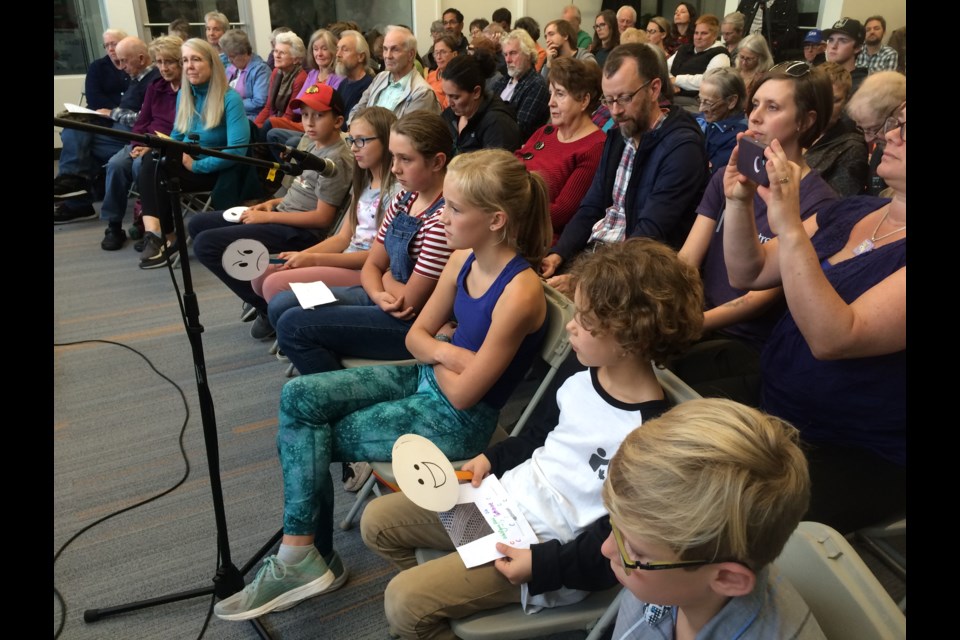All five Nipissing-Timiskaming candidates in the upcoming Federal Election were grilled about their party platforms during an environment debate in North Bay this weekend.
The room at 176 Lakeshore was filled to overflowing with questions coming from concerned youth and young families as well as older citizens, all wanting to know what their future holds.
The children asked a wide range of questions to Liberal candidate Anthony Rota, People’s Party of Canada candidate Mark King, NDP candidate Rob Boulet, Green Party candidate Alex Gomm and Conservative Jordy Carr.
They wanted to know where the candidates stand on everything from single-use plastics to their thoughts on students skipping school to participate in climate strikes.
The candidates agreed that school was important while encouraging the children to continue to find ways to keep up the fight.
All five candidates supported the idea of eliminating single-use plastics.
Brennain Lloyd of Northwatch, one of the debate organizers was pleased to see the children getting involved.
“I really appreciated the questions from the children, and we had a commitment from the group who was organizing the kids that they were not going to script them. The kids came up with their own questions. So, I think that was really important.”
Based on questions from the floor and community leads, Lloyd felt there was an appetite for both action and answers around climate change.
“What I heard from the candidates is a range of responses, not always answering the question asked. It is hard to assess if that is because of the time pressures because they are trying to lay out their platform within the framework presented to them or if something else is going on,” said Lloyd.
“People wanted to know what the candidates are really committed to doing on both a global level about humanitarian aid across borders, to very practical questions like the transportation issues.“
Audience members wanted to know real timelines around targets for greenhouse gas emission reductions and how Canada is going to meet its commitments to the Paris Agreement.
“I think what people wanted to hear was tangible answers about what are you going to do? What is your party going to do? What comes next? People laid out lots of areas where they are looking for action, and they got some answers.”
As a psychiatric physician, Lorin Young wanted to know what Canada’s responsibility is to those countries being directly impacted by CO2 production, using Bangladesh as an example.
“As a country which has contributed to a massive amount of pollution worldwide, because of our resource consumption, CO2 production and our wealth, it has been estimated we should take in about nine per cent of climate refugees. So, what is our responsibility? What is our moral responsibility as Canadians and as a country to take in climate migrants?” asked Young.
“I liked the answer that we are all humans and we have to help fellow human beings, but I was not happy with some of the responses as far as we have to stay here and protect our own first because I think we are responsible when we’ve caused pollution to the rest of the world.”
Back at home, Dave Lewington and his wife work their farm in Lavigne.
As a local farmer he expressed concerns about the environment and how climate change could impact the agricultural industry.
“We’ve got this unintended consequence of food safety regulations having benefited large multi-national companies and penalizing local, small food processors. What that does is inadvertently increase our food miles because multi-national companies are shipping food from further and further away,” said Lewington.
“What I was trying to get at is how we can, not in a way that will create unsafe food, but how we can create some local accountability and local responsibility and fix that food miles issue so our food can be produced locally by willing farmers. The concerns I brought forward was just to make sure that we can find several different ways to help fix the problem as opposed to pigeonholing ourselves into one solution because at times humans have been known to be wrong.”
Lewington walked into the debate uncertain about which candidate he will vote for on Monday, October 21 and left still undecided.
“I think each candidate said some things that made me think that what they said was good, and each candidate said some things that made me wonder a little bit. So, I think we all have work to do, myself included, the people in this room and the candidates themselves.”

.jpg;w=120;h=80;mode=crop)

